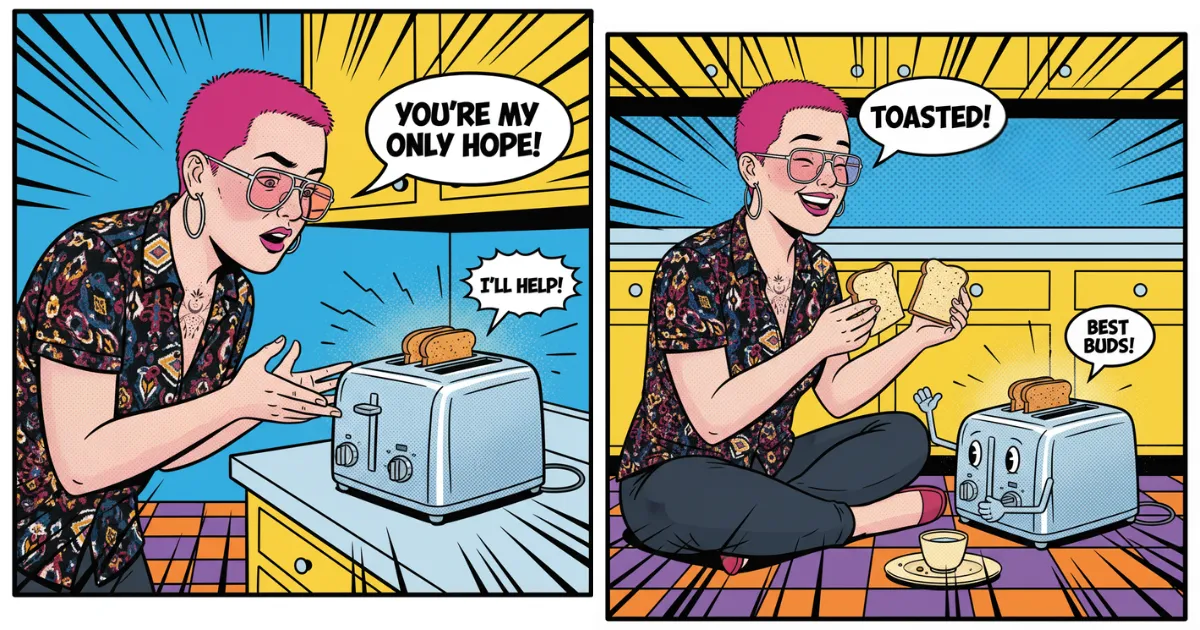
Using AI as Your Digital Swiss Army Knife (Not Your Digital Brain)
2025-07-05
Picture this: You just bought a beautiful, sharp chef’s knife. It’s going to revolutionize your cooking, make meal prep faster, and help you create dishes you never thought possible. But you wouldn’t hand it to a toddler, use it to pry open paint cans, or forget to wash it after cutting raw chicken, right?
That’s exactly how we should think about AI tools like ChatGPT, Claude, and their cousins. They’re incredibly powerful instruments that can transform how we write, research, plan, and create. But just like with any powerful tool, they need to be used with intention, care, and a big ole healthy dose of common sense.
The Real Talk: Sadly, AI Isn’t Going to Take Over Your Life
Let me address the elephant in the room: AI isn’t some sentient being plotting world domination from your laptop. Low key I wish it was. It’s a sophisticated search engine with a really good conversational interface. Just like Google revolutionized how we find information back in the early aughts, AI tools are revolutionizing how we interact with and process that info.
The real danger isn’t that AI will replace human thinking—it’s that we might want to stop thinking for ourselves. And that’s where ethical AI use comes in.
The THINK Framework: Your Handy-Dandy Acronym Guide to Ethical AI
When you’re about to use AI for any task, just T H I N K about it:
Truthsayer: Is this something I can verify? Am I using AI to generate facts I should double-check on my own, or am I using it for creative brainstorming and writing assistance?
Humanness: Am I maintaining my skills and judgment? If I stopped using AI for a month, will I still be able to do my job/hobby/creative work without its assistance?
Info-dumping: What data am I sharing, and where is it going? Am I feeding sensitive personal, work, or financial information into a system that will store or might learn from it?
Need vs. want: Do I actually need AI for this task, or am I just being lazy? There’s a difference between using AI to help brainstorm blog topics and using it to write your entire master’s thesis.
Kindergarten: Will using AI for this task help me grow and learn, or will it make me more dependent and less capable over time? Am I regressing back to Kindergarten?
Okay, okay, it doesn’t have to make perfect sense. It’s just a framework to get you thinking! I probably should’ve used AI for this acronym…
Getting Started: Two Paths to Ethical AI Use
Level 1: The Thoughtful Configurator
Start with mainstream tools but configure them mindfully:
- Create separate accounts for different purposes (work vs. personal)
- Turn off data retention in ChatGPT settings, use Claude’s temporary chats, or similar privacy features
- Set personal rules: Maybe you use AI for first drafts but always edit heavily, or research with AI but verify facts through traditional sources
- Practice the “explain it back” test: After AI helps you understand something, try explaining it to someone else without looking
Level 2: The Privacy Pioneer
For those ready to dive deeper:
- Explore local AI options like Ollama or GPT4All that run entirely locally on your computer
- Set up a dedicated AI computer or partition that bad boy if you’re working with sensitive information
- Learn prompt engineering to get better results without sharing more personal context
- Join communities focused on privacy-preserving AI to stay updated on new tools and techniques
Red Flags: When AI Use Becomes Problematic
Watch out for these warning signs in yourself or others:
- Emotional dependency: Feeling like the AI “understands” you better than humans, or preferring AI conversations to human ones
- Skill atrophy: Finding yourself unable to write, research, or solve problems without AI assistance
- Truth confusion: Struggling to distinguish between AI-generated content and factual information
- Privacy erosion: Sharing increasingly personal or sensitive information without considering the consequences
- Environmental denial: Ignoring that every AI query has a carbon footprint (current estimates suggest ChatGPT uses as much electricity as 175,000 homes)
The Bottom Line: Stay Human
The goal isn’t to avoid AI but to use it as a power tool that amplifies your own natural capabilities rather than replacing them. Think of AI as your research assistant, your writing partner, your brainstorming buddy…not your brain.
Just like that chef’s knife we talked about earlier, AI tools can help you create amazing things. But the creativity, the judgment, the critical thinking, and the human touch? That’s all you, baaaabyyyyy. Keep it that way.
The future isn’t about humans versus AI—it’s about humans with AI. And the “with” part means you’re still holding the chef’s knife.
Want to dive deeper into cybersecurity topics that actually matter to real people? Come back here sometime for very random and sporadic posts that translate tech jargon into plain English, because everyone deserves to understand the digital world they live in.